How Tenants Suffer in Silence
Tenants are often the most vulnerable in the housing system, and their suffering is deep but rarely acknowledged.
Many are forced to live in poor conditions — leaking roofs, unreliable electricity, broken plumbing, or homes infested with pests. Yet, when they report these issues, landlords may delay or ignore repairs completely.
Financially, tenants carry a heavy burden. Rent can consume 40% to 70% of their income, leaving little for food, transport, or emergencies. Some are forced to borrow money just to keep a roof over their heads. To make matters worse, they often face unfair and illegal charges — non-refundable inspection fees, inflated caution deposits, hidden agent fees, or unexplained renewal costs.
Evictions are another silent crisis. Tenants can be thrown out with little or no notice, even when they’ve tried to pay or negotiate in good faith. They often suffer in silence because they fear backlash or don’t fully know their rights. This lack of voice makes them easy targets for exploitation.
Discrimination also plays a role — some landlords refuse to rent to people based on tribe, religion, marital status, or even the number of children they have. Add to that the stress and time wasted walking long distances for inspections, paying multiple agents, and dealing with broken promises — and it becomes clear: being a tenant, especially in low- to middle-income areas, is a constant struggle.
The suffering of tenants is real. It is financial, emotional, and psychological — and it’s time their voices were heard.
Tenants are often the most vulnerable in the housing system, and their suffering is deep but rarely acknowledged.
Many are forced to live in poor conditions — leaking roofs, unreliable electricity, broken plumbing, or homes infested with pests. Yet, when they report these issues, landlords may delay or ignore repairs completely.
Financially, tenants carry a heavy burden. Rent can consume 40% to 70% of their income, leaving little for food, transport, or emergencies. Some are forced to borrow money just to keep a roof over their heads. To make matters worse, they often face unfair and illegal charges — non-refundable inspection fees, inflated caution deposits, hidden agent fees, or unexplained renewal costs.
Evictions are another silent crisis. Tenants can be thrown out with little or no notice, even when they’ve tried to pay or negotiate in good faith. They often suffer in silence because they fear backlash or don’t fully know their rights. This lack of voice makes them easy targets for exploitation.
Discrimination also plays a role — some landlords refuse to rent to people based on tribe, religion, marital status, or even the number of children they have. Add to that the stress and time wasted walking long distances for inspections, paying multiple agents, and dealing with broken promises — and it becomes clear: being a tenant, especially in low- to middle-income areas, is a constant struggle.
The suffering of tenants is real. It is financial, emotional, and psychological — and it’s time their voices were heard.
How Tenants Suffer in Silence
Tenants are often the most vulnerable in the housing system, and their suffering is deep but rarely acknowledged.
Many are forced to live in poor conditions — leaking roofs, unreliable electricity, broken plumbing, or homes infested with pests. Yet, when they report these issues, landlords may delay or ignore repairs completely.
Financially, tenants carry a heavy burden. Rent can consume 40% to 70% of their income, leaving little for food, transport, or emergencies. Some are forced to borrow money just to keep a roof over their heads. To make matters worse, they often face unfair and illegal charges — non-refundable inspection fees, inflated caution deposits, hidden agent fees, or unexplained renewal costs.
Evictions are another silent crisis. Tenants can be thrown out with little or no notice, even when they’ve tried to pay or negotiate in good faith. They often suffer in silence because they fear backlash or don’t fully know their rights. This lack of voice makes them easy targets for exploitation.
Discrimination also plays a role — some landlords refuse to rent to people based on tribe, religion, marital status, or even the number of children they have. Add to that the stress and time wasted walking long distances for inspections, paying multiple agents, and dealing with broken promises — and it becomes clear: being a tenant, especially in low- to middle-income areas, is a constant struggle.
The suffering of tenants is real. It is financial, emotional, and psychological — and it’s time their voices were heard.





